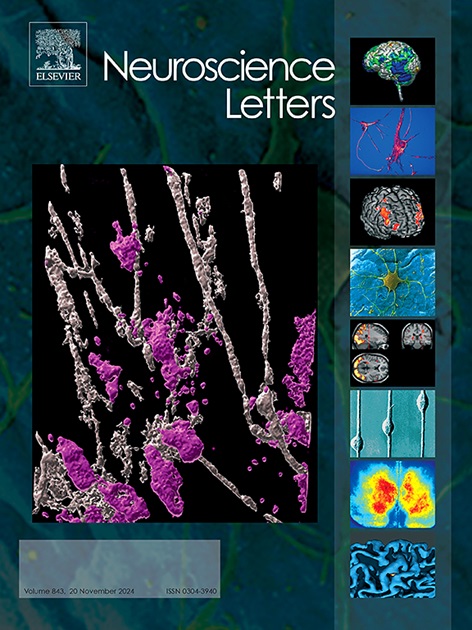Tyrosol ameliorates depressive-like behavior and hippocampal damage in perimenopausal depression rats by inhibiting oxidative stress and thyroid dysfunction
IF 2
4区 医学
Q3 NEUROSCIENCES
引用次数: 0
Abstract
Perimenopausal depression (PMD) is a common condition during the female perimenopausal period. Tyrosol represents a promising neuroprotective agent. This study aims to determine if tyrosol alleviate PMD progression. A rat model of PMD was established using bilateral ovariectomy and chronic unpredictable mild stress. Behavioral tests showed that tyrosol alleviated the depressive-like behavior in PMD rats. Tyrosol increased sucrose preference in SPT and residence time in the central region of OFT, and reduced immobility time in FST of PMD rats. Apoptosis of neurons in the hippocampus of PMD rats was inhibited by tyrosol treatment, as evidenced by an increase in the protein expression of Bcl-2 and a decrease in the expression of Bax and cleaved caspase-3 in hippocampal tissue. Tyrosol treatment effectively reduced thyroid-stimulating hormone levels and elevated the levels of free triiodothyronine and free thyroxine in the serum of PMD rats. The levels of ROS and MDA were decreased, and the levels of GPX and SOD were increased in the hippocampal tissue of PMD rats by tyrosol treatment. In addition, tyrosol treatment promoted the levels of brain-derived neurotrophic factor (BDNF) and monoamine neurotransmitters (5-HT, DA, and NA) in the hippocampal tissue. In summary, tyrosol might ameliorate depression-like behavior in PMD rats by inhibiting hippocampal oxidative stress and damage and promoting monoamine neurotransmitter release, and restoration of thyroid function may also be involved.
Tyrosol通过抑制氧化应激和甲状腺功能障碍改善围绝经期抑郁症大鼠的抑郁样行为和海马损伤。
围绝经期抑郁症(PMD)是女性围绝经期的一种常见疾病。Tyrosol是一种很有前途的神经保护剂。本研究旨在确定tyrosol是否能缓解PMD的进展。采用双侧卵巢切除和慢性不可预测的轻度应激建立大鼠PMD模型。行为学试验表明,酪醇可减轻PMD大鼠的抑郁样行为。Tyrosol增加了PMD大鼠SPT的蔗糖偏好和OFT中心区域的停留时间,并减少了FST的静止时间。酪醇可抑制PMD大鼠海马神经元凋亡,海马组织中Bcl-2蛋白表达升高,Bax和cleaved caspase-3蛋白表达降低。Tyrosol治疗可有效降低PMD大鼠血清中促甲状腺激素水平,提高游离三碘甲状腺原氨酸和游离甲状腺素水平。酪醇可使PMD大鼠海马组织中ROS、MDA水平降低,GPX、SOD水平升高。此外,tyrosol治疗可提高海马组织中脑源性神经营养因子(BDNF)和单胺类神经递质(5-HT、DA和NA)的水平。综上所述,tyrosol可能通过抑制海马氧化应激和损伤、促进单胺类神经递质释放来改善PMD大鼠的抑郁样行为,并可能参与甲状腺功能的恢复。
本文章由计算机程序翻译,如有差异,请以英文原文为准。
求助全文
约1分钟内获得全文
求助全文
来源期刊

Neuroscience Letters
医学-神经科学
CiteScore
5.20
自引率
0.00%
发文量
408
审稿时长
50 days
期刊介绍:
Neuroscience Letters is devoted to the rapid publication of short, high-quality papers of interest to the broad community of neuroscientists. Only papers which will make a significant addition to the literature in the field will be published. Papers in all areas of neuroscience - molecular, cellular, developmental, systems, behavioral and cognitive, as well as computational - will be considered for publication. Submission of laboratory investigations that shed light on disease mechanisms is encouraged. Special Issues, edited by Guest Editors to cover new and rapidly-moving areas, will include invited mini-reviews. Occasional mini-reviews in especially timely areas will be considered for publication, without invitation, outside of Special Issues; these un-solicited mini-reviews can be submitted without invitation but must be of very high quality. Clinical studies will also be published if they provide new information about organization or actions of the nervous system, or provide new insights into the neurobiology of disease. NSL does not publish case reports.
 求助内容:
求助内容: 应助结果提醒方式:
应助结果提醒方式:


